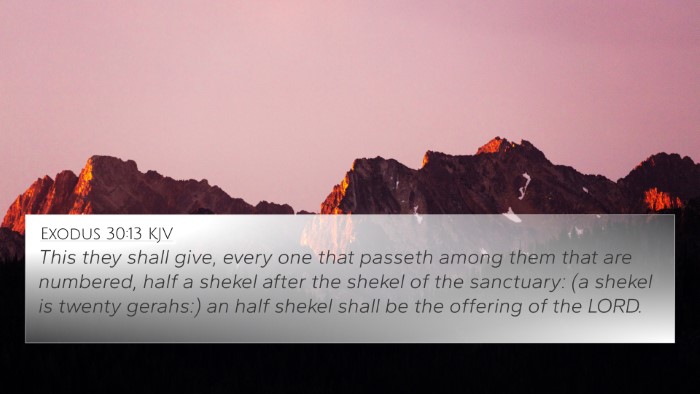Understanding Matthew 17:24
Bible Verse: "And when they were come to Capernaum, they that received tribute money came to Peter, and said, Doth not your master pay tribute?" - Matthew 17:24 (KJV)
Summary of Meaning
This verse captures a moment when Jesus and His disciples arrive in Capernaum. The collection of tribute or temple tax is highlighted, bringing forth implications about the nature of Jesus's role in relation to the laws of His time.
Public domain commentaries provide insights into the significance of this event. Matthew Henry speaks to the administrative aspects of Jewish law, particularly regarding the requirement to pay the temple tax. Adam Clarke emphasizes the lesson about Jesus's identity and His relationship to the temple. Albert Barnes adds that this incident was not just about taxes, but also illuminated the broader themes of authority, belonging, and temporal obligations.
Key Insights from Commentaries
- Matthew Henry: Highlights the obligation of Jews to pay the temple tax, illustrating the cultural context of Jesus's ministry. He suggests that Jesus, being the Son of God, had the right to be exempt from the tax, yet chose to fulfill the law to avoid offense.
- Albert Barnes: Notes the question posed to Peter reflects a broader societal expectation of Jesus's role. He explains that the tribute money highlights Jesus’s humble approach, aligning with His mission of servitude and obedience to the law.
- Adam Clarke: Describes this as a pivotal moment in understanding Jesus’s recognition of societal norms, which can be viewed in contrast with His divine authority. Clarke emphasizes that the tax collectors recognized Jesus based on Peter's association with Him.
Cross-References
This verse relates to several other scriptures that illuminate Jesus's ministry and the nature of His kingdom:
- Exodus 30:13-15: Discusses the commandment regarding the temple tax.
- Matthew 17:25: Jesus’s response to Peter about whether or not the kings of the earth take tribute from their own children.
- Romans 13:6-7: Encourages believers to pay taxes as a form of submission to earthly authorities instituted by God.
- Matthew 22:17-21: Discusses rendering unto Caesar what is Caesar's, addressing the question of civic duty.
- Luke 2:41-42: Shows Jesus’s early recognition of His identity in the context of temple worship.
- John 2:13-16: References Jesus cleansing the temple, highlighting His relationship with the temple as not merely a place of taxation.
- Philippians 2:7-8: Illustrates Jesus's humility and servanthood, resonating with the themes of taxation and obligation.
Thematic Connections
The narrative of Matthew 17:24 aligns with broader Biblical themes, including:
- The nature of Jesus as both fully divine and fully human.
- The relationship of law and grace in Jesus’s ministry.
- The tension between earthly authorities and spiritual allegiance.
Application of This Verse
This verse encourages an understanding of how Christ navigated cultural obligations while maintaining His divine identity. It prompts reflection on modern issues of law versus grace and the believer's role within society as a representative of Christ.
Believers can draw parallels between their lives and the humility demonstrated by Jesus, guiding their interactions with societal structures without losing sight of their identity in Christ.
Further Cross-Referencing Resources
For those wishing to conduct a comprehensive Bible cross-reference study, consider utilizing:
- Bible Concordance: A tool to find particular scriptures relating to specific themes.
- Bible Cross-Reference Guide: A helpful resource for linking Bible verses that relate to each other.
- Cross-Referencing Bible Study Methods: Techniques for identifying connections between the Old and New Testaments.
Conclusion
Matthew 17:24 serves as a profound reminder of Jesus's mission and His approach to cultural norms. Through careful study and cross-referencing, believers can deepen their understanding of this passage's implications, drawing connections to the greater narrative of scripture.





